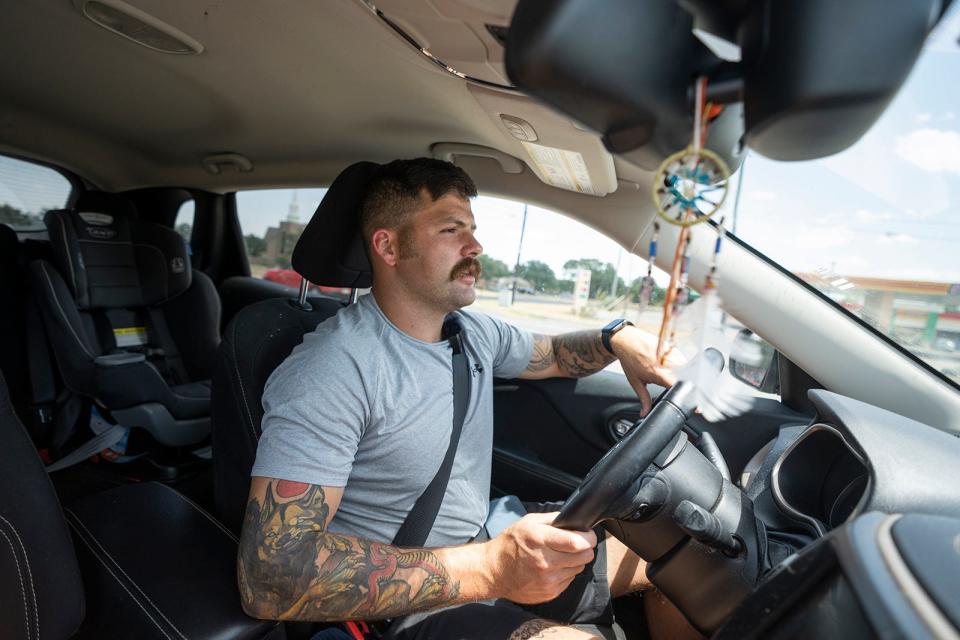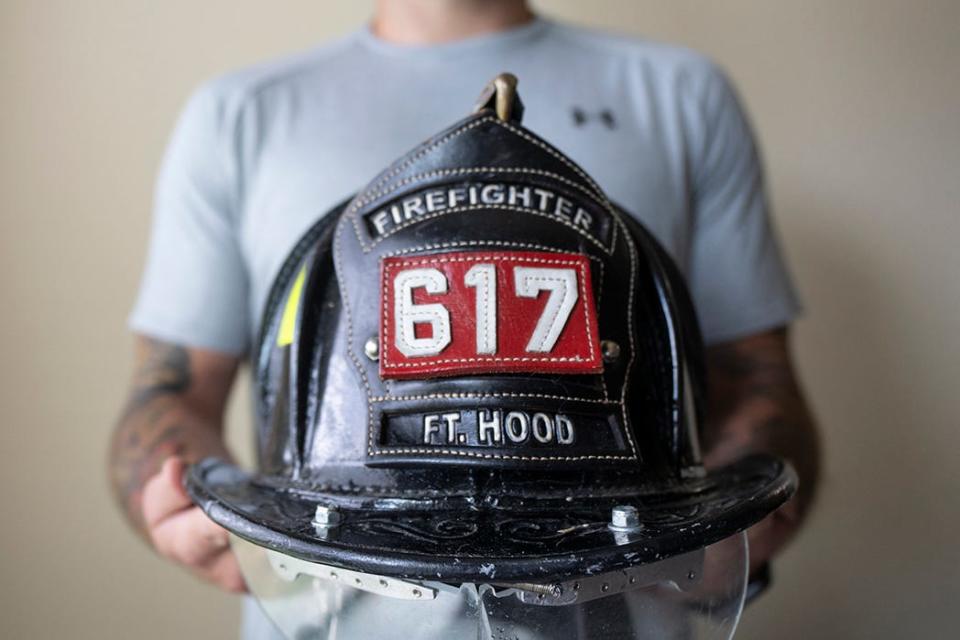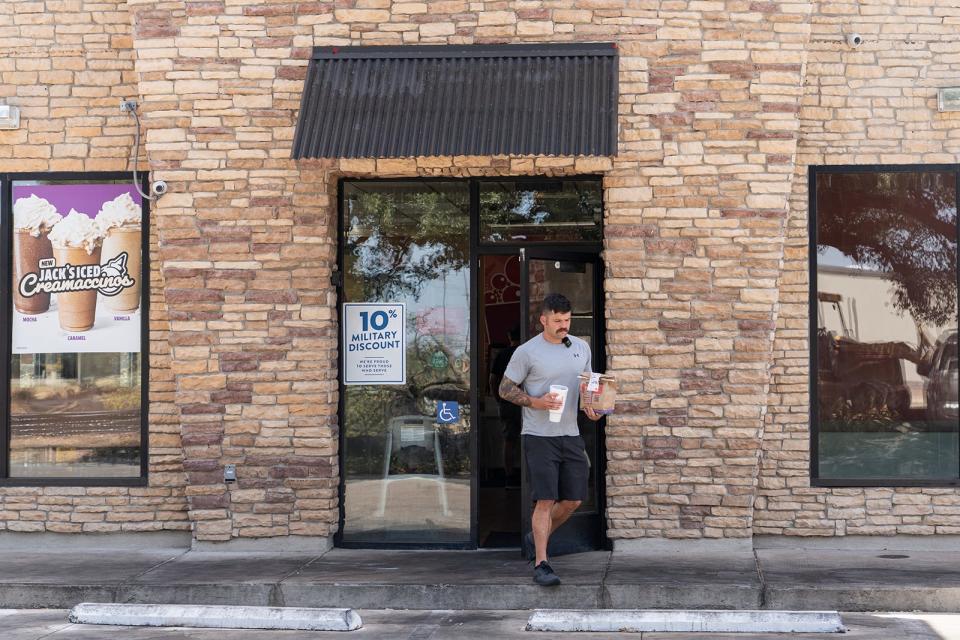Amid union contract negotiations, Austin firefighters struggle to make ends meet
TEMPLE — Jordan Brown had just finished his 24-hour shift at Fire Station 40 in North Austin on Wednesday. He'd run four calls the night before and barely slept.
Now he faced an hourlong drive home to Temple, but sleep would have to wait. Next, he would start making deliveries for DoorDash.
It's something he does on a regular basis, along with selling plasma, taking odd manual labor jobs and working overtime at the fire station. His base salary as a four-year firefighter totals $71,125. Last year, after working 300 hours of overtime, he made $81,247. After various deductions, including an 18.7% pension rate, he brought home only $51,443. Without overtime, Brown brings home about $1,640 every two weeks. His wife also works.
But with a mortgage, car payments, insurance, two kids, child care, groceries and utilities, they struggle to pay their nearly $5,000 in monthly bills, he said.
Brown began working as a firefighter in 2011 for the Army and then moved to the Department of Defense. Joining the Austin Fire Department academy four years ago was supposed to be a step up for him.
Then he got his first paycheck. After all the deductions, the dollar amount was lower than he'd expected.
"Austin was supposed to be our step forward," Brown said. "It has 100% been two steps back."

Pay raises have been at the crux of the bargaining breakdown between the Austin Firefighters Association, the union that represents firefighters, and the city of Austin. The two parties were unable to reach an agreement on a new contract, and it will now be decided through binding arbitration. Both sides gave their final evidence to the three-person arbitration panel Aug. 11, and a decision is expected in mid-September.
Unlike other public safety sectors, the Austin Fire Department isn't suffering from a large number of vacancies. As of Aug. 18, the department had a staff of more than 1,200, with 13 vacancies.
But the union says pay is a pressing issue. Smaller cities surrounding Austin offer higher pay to firefighters, though the city says its pay exceeds that of Texas' other major cities.
In a survey last year, the union found that only 1% of its members believed their wages had kept up with the cost of living. Fewer than 30% said they felt financially secure enough to cover emergency expenses.
What does the union say?
Bob Nicks, president of the Austin Firefighters Association, said the city used to have a competitive salary range for firefighters, making it one of the best-paid departments in the state. But that was eight years ago.
Nicks provided the Statesman with data that show entry-level firefighters in Austin make less than those in Cedar Park, Georgetown, Pflugerville, Round Rock and six other cities in the area. The top-level firefighters, with 21 years in Austin, are the fifth-highest paid in the region.
A firefighter in Austin starts out making $55,259 and after 21 years makes $95,307. However, Brown said much of his salary is eaten up by the department's pension plan, which by state law takes 18.7% of his paycheck, as well as insurance and taxes.
Nicks shared a document showing that city, police and emergency medical services employees all received bigger pay raises in the past 10 years than firefighters.

Firefighters feel disrespected to the point that "morale is in the toilet," Nicks said at the city's Public Safety Commission meeting earlier this month.
Brown said most firefighters he knows have to work overtime or take other jobs to afford to live and raise families in the Austin area.
Austin firefighters work a 53-hour week, and overtime means even less time spent with their families.
The city proposed a salary increase of 4%, but that wouldn't be enough to keep firefighters' salaries competitive, Nicks said.
An Aug. 10 memo sent to City Council members said that the union and the city had reached “agreeable contact language.” The city asked Nicks to recommend that union members approve the contract, saying it’s standard practice for the city to ask union leaders to do so.
But Nicks declined to recommend the contract because he’d pledged not to tell union members how to vote. He also disputed that the city asks all union leaders to recommend contracts, noting that he was not asked to do so for the last contract in 2017.
Ultimately, Nicks said he doesn't think the city understands how firefighters are struggling.
"They still like this narrative that we're overpaid," he said. "That's not the situation anymore. ... (Firefighters) just really love the work. But I think we also need to have the appreciation of the city in terms of making sure our life balance is also being taken care of and that our wages are high enough that we can survive in this hot economic area."
What does the city say?
City spokesperson Shelley Parks said an analysis of other large Texas cities — Houston, Dallas, El Paso, San Antonio, Corpus Christi, Arlington and Fort Worth — showed that Austin firefighters' salaries are above or near these cities, making Austin the "best paid."
A copy of this analysis, provided to the Statesman, shows that Arlington, Dallas and Fort Worth pay entry-level firefighters more than Austin does. However, the highest step for Austin, which is reached after 21 years, is the highest compared with those cities.
Nicks said that while Austin might have a high final step, many other cities and suburbs do not make firefighters wait more than 20 years to reach that level.
Parks said in an email that Austin has “overall the best-paid fire department among comparator cities in Texas” but acknowledged that some pay levels are higher elsewhere.
"It is possible to say that some individual pay elements for some firefighters in some other cities at some individual points in their careers may exceed the pay for a comparable Austin firefighter," Parks said.
On the issue of firefighters paying 18.7% of their pension, the city said the figure is dictated by state law and that the city also contributes 22.05% of a firefighter's base pay to the pension.

Tempting to leave for better pay
Brown said his family always struggles to make ends meet. His 2-year-old son needed surgery this year, forcing Brown to work more overtime shifts to pay for it.
For Brown, it's tempting to leave for one of the other cities in the area that pay more. But he doesn't want to put his family through another pay cut. Even though he's certified, he would have to go through that city's fire academy and then start over on his pay steps.
And those academies are physically demanding, he said. He recalled that the Austin academy was so grueling that he hurt his back and had to finish his final week in a brace, so leaving to join a new fire department isn't appealing.
Instead, he's asking the city to pay him enough money to be able to pay his bills without working hundreds of hours of overtime a year.
"I'm not asking to be rich," Brown said. "When you have (wildfire) season, when you have a winter storm, when you have a staffing crisis, it's expected that I'm going to forgo taking care of my family to take care of the citizens. That's what I signed up for. But at the end of the day, my hope is that the city would feel obligated or responsible for my family, as well."
This article originally appeared on Austin American-Statesman: Austin firefighters' contract with city to be decided in arbitration
